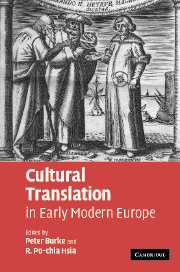Introduction
Published online by Cambridge University Press: 27 July 2009
Summary
Just as the Tower of Babel collapsed because its builders were dispersed by the diversity of tongues, the House of the European Community would surely fall if deprived of its army of interpreters: for who would know the differences between cod, kabeljauw, morue and bacalhau (the most dedicated gourmands excepted) and be able to smooth over rival national claims to fishing rights and sauce preparations but the dedicated translators and interpreters of the EU?
If communication between languages and cultures is an assumed and accepted fact in our contemporary world, it was by no means self-evident in the past. Yet all major cultural exchanges in history involved translation: be it the rendering of Buddhist texts from Sanskrit and Pali into Chinese during the early medieval period; or the transmission of Greek philosophy into Arabic in the early medieval, and the subsequent translation of the same texts from Arabic into Latin during the high medieval centuries; or the more recent translations of Western texts into Japanese and Chinese that marked the modernization of those two East Asian civilizations in the late nineteenth and early twentieth centuries.
All the same, it was Europe that represented the scene of the most sustained and intense cultural transfers throughout its long history, a process marked by an enormous effort in translation: of religious, scientific, political and literary works from a large variety of vernaculars into Latin and vice versa, and of vernaculars crossing national and linguistic boundaries.
- Type
- Chapter
- Information
- Cultural Translation in Early Modern Europe , pp. 1 - 4Publisher: Cambridge University PressPrint publication year: 2007
- 2
- Cited by



